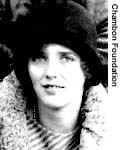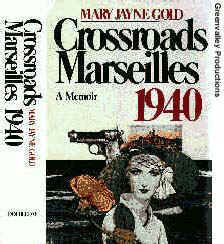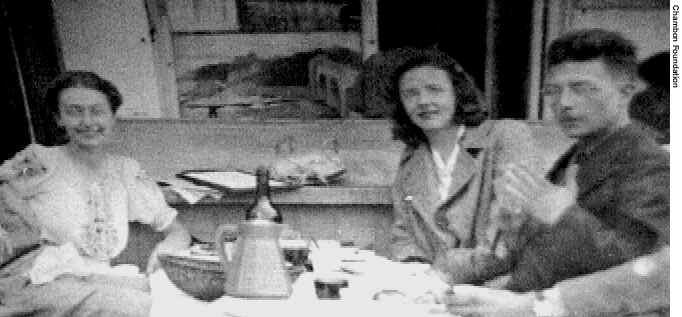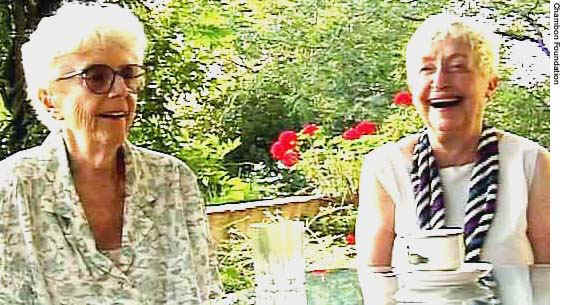

[Varian Fry Institute Home] [Chambon Foundation Home]


CROSSROADS MARSEILLES 1940
by Mary Jayne Gold
a synopsis by the author
© 1980 by Mary Jayne Gold. All rights reserved.
"Crossroads Marseilles 1940" deals with a part of my life that I remember vividly because it was so exciting. Parts of it were painful to relate but still I wanted to relive it. The book, published by Doubleday in 1980, was the result.
I am an upper middle class wasp born and raised in Chicago, Evanston and Michigan. I attended the Master's School at Dobbs Ferry, New York and a finishing school in Italy. For ten years before the war I lived in Europe, dividing my time between Paris, London and the fashionable resorts. I flew my own plane, skied all winter, visited innumerable museums and in general had a pleasant carefree time.
Then suddenly I found myself, along with several million others, on the congested roads of France, fleeing before the German Army. It caught up with me in Biarritz. I had with me a two-year-old boy, Peterkin, the son of friends, Daniel and Theo Bénédite, whom I was supposed to rescue and take to the States. This proved to be impossible without proper documents so I was obliged to return the child to his mother staying in what was then known as the Unoccupied Zone in southern France. I continued on to Marseille where I intended to get my own papers in order and proceed to the United States.
I immediately became involved with a young deserter from the Foreign Legion. He persuaded me that I should buy a small trawler that he could sail to Gibraltar with twelve other Legionnaires, who also wished to desert and continue the fight from England. Killer, as I affectionately called my friend—he got the nickname from the way he murdered the English language—was suddenly arrested by the military police before our plan could materialize. He was held in the Fort St Nicolas in the Marseille harbor pending trial.

Miriam Davenport Ebel, Mary Jayne Gold, Gold's gangster
boyfriend, future World War II hero Raymond Couraud at dinner in Marseille in
1940

Miriam Davenport Ebel (right) visits Mary Jayne Gold at
the latter's villa in Gassin, France, in 1997, two months before Ms. Gold's
death
Thanks to the efforts of my new friend Miriam Davenport, I next became a member of Varian Fry's American Relief Center (the Marseille operation of New York's Emergency Rescue Committee), which performed an amazing Scarlet Pimpernel operation after the fall of France. spiriting out of the country by legal or illegal means hundreds of anti-Nazi intellectual and political refugees. By a clause in the French Armistice they were now subject to extradition and death in Hitler's Europe. The collaborationist Vichy government refused to grant them exit visas in order to keep them on the shelf waiting to be picked up by the Gestapo. Among our famous "clients" were André Breton, Marc Chagall, Lion Feutchwanger, Jacques Hadamard, Konrad Heiden, Otto Meyerhoff, Walter Mehring, Victor Serge, Franz Werfel. To the list of notabilities were added many rank and file militants who were in equal danger. All told about two thousand individuals were assisted in one way or another.
Most of the staff of the Emergency Rescue Committee including Varian and myself lived in a large Victorian vllla, Air-Bel, on the outskirts of Marseilles. We ranged in age from twenty-five to early thirties. André Breton, his beautiful wife, Jacqueline and little daughter Aube soon joined us as well as the Trotskyist writer Victor Serge. The Surrealists who found themselves in the region soon flocked around Breton and on weekends we all played Surrealist games with Breton, Victor Brauner, André Masson, Wifredo Lam, Oscar Dominguez and others.
Victor Serge and his son Vladi introduced me to revolutionary Marxism, anti-Stalin brand. On the occasion of Marshal Pétain’s visit to Marseilles most of the Air-Bel contingent were picked up and held incommunicado. Serge who had done time in both bourgeois jails instructed me in the elementary principles of prison survival.
At this point, Killer surfaced. Due to his extreme youth he had received a delayed sentence and came to spend his leave with me, prior to rejoining the Foreign Legion's home base in Algeria. Instead he re-deserted and joined a Corsican gang in Marseille’s underworld. For a short while, I hoped he would work in the illegal activities of the ERC but Killer just hated all those intellectuals. I hung on to both worlds as long as I could until it became apparent that my boyfriend's underworld life would compromise the Committee, which was already having a hard time fooling the French police and the Gestapo. I was forced to withdraw from the more noble enterprise and so became a gangster's moll of sorts. However I continued to contribute considerable sums of money to the ERC.
Killer did not think that this was the direction in which the money should flow. Urged on by Mathieu, his miniature gangland chief, he stole all my jewelry. Mathieu, after first making a declaration of love, offered to put Killer six feet underground and recover the diamonds. I knew that what he wanted was Killer's skin and 100% of the take. I firmly refused the offer. All this led to a showdown between the gangsters, Killer and myself. I sided with my now endangered boyfriend. He was overcome with remorse—and gratitude for life.
Realizing that he was now more or less washed up with me, in danger from the gang and that he would now have the civil and military police close on his heels, tipped off by the traitorous Mathieu, he decided it was time he left for England to continue the good fight, as he had intended at the outset.. I found him a contact with an underground railroad through Spain. In England Killer became a British officer in the Commandos, where he belonged. He was awarded the Victoria Cross for Gallantry in battle. These were his glorious years and he always said I had given them to him.
I returned briefly to the Committee and then left for Lisbon and the United States.
After a nostalgic glimpse of pre-war Europe, "Crossroads Marseilles 1940" is an action story, with an emphasis on the personal and sometimes the humorous. I have tried to evoke those desperate heroic days, so different from the present, before the disenchantment set in. Much of the appeal, I dare say, lies in the human incidentals of an exciting experience, in a series of real events that lie just behind the facade of official history.
At any rate, 1940-41 was quite a year for a nice girl from Evanston.
Back to Crossroads Marseilles 1940
[Varian Fry Institute Home] [Chambon Foundation Home]
[email us] [contact information] [table of contents] [search] [feedback] [guest book] [link to us?]
© Copyright 2006. Chambon Foundation. All rights reserved. Revised: February 12, 2008